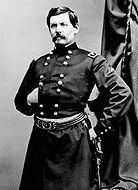Unbeknownst to Union Maj. General George B. McClellan, today his months-long offensive against Richmond moves into its final phase.
The beginning of the end takes the form of a minor Union offensive action. On the outskirts of Richmond and separated by a strip of forest some 1200 yards wide, Union and Confederate forces since the first of the month have been stalemated. Now, McClellan makes a move to advance his siege guns within firing range of the Confederate capital, and is engaged by Confederate forces. When darkness falls and the smoke clears some 1000 casualties total are counted, while Union forces have gained only 600 yards of ground. More importantly, Confederate General Robert E. Lee is ready to begin his offensive against McClellan, a move that within 24 hours will have McClellan clearly on the defensive. When the series of battles known as the Seven Days Battles ends, Richmond will finally be safe from McClellan’s army.
Meanwhile, North Carolina Baptist E. Dodson criticizes his state’s churches for not being patriotic enough on behalf of the Confederacy:
Association after Association, and church meeting after church meeting has passed since this war began, and no fast day has been established. Do not christian parents love their children enough to fast and pray for them when they are exposed to death constantly? Alas, for the neglect of the churches!
Dodson is not the only Southern Baptist criticizing, rightly or wrongly, a lack of patriotism on the part of local Baptist churches. Georgia Baptist’s Christian Index editor Samuel Boykin later makes similar charges concerning rural Baptist churches in his state, and there are indications that Boykin’s lamentations have some basis in reality.
At the same time, the (Northern) American Baptist Home Mission Society today appoints the organization’s first laborers among Southern freedmen. Whether fighting for the preservation of African slavery (Southern Baptists) or against the institution (Northern Baptists), Baptists are thus active on the battlefield, in print, and through missionary agencies.
Sources: Seven Days Battles (link); Battle of Oak Grove (link); E. Dodson, “Fasting and Prayer,” Biblical Recorder, June 25, 1862 (link); The Baptist Home Missions Monthly, Volumes 11-12, p. 222 (link); regarding Samuel Boykin, see Bruce T. Gourley, Diverging Loyalties: Baptists in Middle Georgia During the Civil War, Macon, Ga.: Mercer University Press, 2011 (link)



